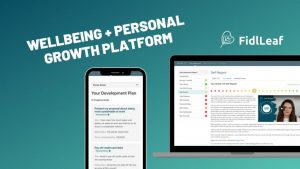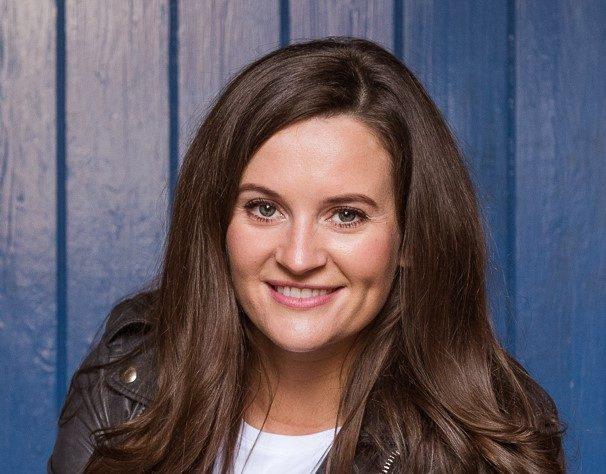We caught up with Sophie Coulthard, co-founder of FidlLeaf, to talk all things from the importance of investing in employee wellbeing, to the need for personalised content as people stay away from the office…
Tell us about FidlLeaf
FidlLeaf is a wellbeing and personal development platform that’s completely tailored to the user. We use Nobel-Prize nominated science to measure 10 key wellbeing areas and then deliver the results and development support through the platform, so it’s like a digital, personalised, interactive self-help book.
For anyone that’s ever bought a self-help book and found that it didn’t pinpoint their issue, who wants to understand their own behaviours that impact their wellbeing and improve their relationship with themselves then FidlLeaf is for them. We believe that wellbeing starts with self-awareness and this is what our science delivers. Our users can then work through our carefully curated development content and build their own personal development plan, all from within the platform.
We offer individual and company subscriptions, and organisations also receive an overview of the wellbeing trends of their team, anonymously highlighting any collective areas for development. This can help them to look at company-wide initiatives and deliver more targeted support. We often find that instead of yoga, assertiveness training might be what a team needs to improve their wellbeing.

How did you come up with the idea for the company?
The idea started around 12 years ago when I first took the self-awareness assessment that we now feature in the platform. I’d taken personality assessments before, but never anything like this that looked at how my behaviours and values impacted on my wellbeing. The assessment was primarily used by consultants and was very academic and not user friendly, it had to be interpreted by someone who had been trained. I could instantly see how it could help people if it was delivered in a different way.
My results from the first time taking the assessment made me reflect and make positive changes in my life. Over the following years, I thought about how I could develop the tool into something that others could benefit from too. This really started to take shape after I met Adam Alton, my co-founder, as his experience as a developer meant that my ideas and sketches could finally be bought to life.
We looked at other wellbeing platforms out there, particularly the ones companies provide to their employees, and noticed that they all felt very corporate. They didn’t look or feel like something you would use outside of work or enjoy using. So we decided to make FidlLeaf look and feel as relatable as possible. A lot of our development content is made up of videos and podcasts, with the thought behind that being to deliver content in the way that people like to consume content. A 23-year-old woman who wants to take control of her high self-criticism may not relate to a corporate video of a 50-year-old man in front of a whiteboard, but they might resonate with a YouTuber who shares their experience and talks through the steps they took to reduce it.
More from Interviews
- A Chat with Kebbie Sebastian, CEO and Founder of Merge
- Meet Dr Agnès Leroy, GPU Director at Cryptography Tool: Zama
- Meet Roman Eloshvili, Founder of ComplyControl
- Inside Mobile Payments with Bojoko’s Ville Saari
- Meet Steve Haskew, Group Director of Sustainability and Growth At Circular Computing
- A Chat with Hakob Astabatsyan, CEO and Co-Founder of Synthflow AI
- Meet Ernesto Suarez, CEO at Travel Insurance Provider: Gigasure
- Under Pressure and On the Clock: Gurhan Kiziloz’s Nexus International to Hit $1.45B Revenue in 2025
How has the need for FidlLeaf evolved during the pandemic?
Before the pandemic, we were very close to launching FidlLeaf and planned to launch to companies only. However, as wellbeing became a hot topic over the course of lockdown and more people asked us if they could purchase the platform just for themselves, we realised we needed to make it available to both individuals and companies right away. Technically it wasn’t difficult to do, it just required some changes to our marketing efforts and we also decided to launch through the Back Her Business Crowdfunder initiative as we felt this would be a great way to reach a wider audience.
I think that companies are starting to realise that their old wellbeing strategies such as perk apps and social activities are falling redundant as more people stay away from the office. I also think there’s a realisation that wellbeing initiatives should go deeper and that companies should support people personally. There has never been a more blurred line between work life and personal life, so we hope our ethos of ‘supporting the personal stuff’ so that people can get more out of work and life gets adopted by more companies moving forwards.
One thing that has come out of the pandemic for many people is an appreciation of their own wellbeing; what fulfills them, what matters to them. I don’t know a single person who hasn’t had a ‘wobble’ of sorts at some point over the last six months. And whilst mental health is often talked about and there is a growing awareness around it, I don’t think there is enough out there for people who are generally in good mental health, but just might have an occasional ‘wobble’ and would benefit from some support and personal development. We hope FidlLeaf can provide that for them.
What can we hope to see from FidlLeaf in the future?
We are looking forward to welcoming our first users when our crowdfund closes, and have a lot of plans to bring more development content into the platform, including short courses that align with the 10 wellbeing areas and launching our own podcast. We also hope to work with content creators in the personal development sector so that we can deliver the best possible experience to our users.
There is also a research aspect to FidlLeaf because of the assessment tool, so we look forward to being able to use that data to build a better picture of wellbeing needs and exactly what type of development content delivers the best results. We hope our research can one day help to inform companies, universities and even the government on best wellbeing practice.



